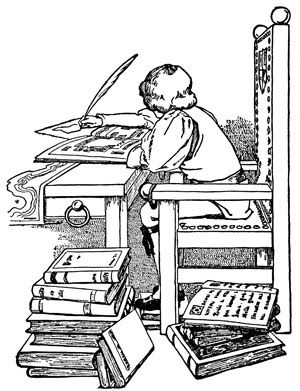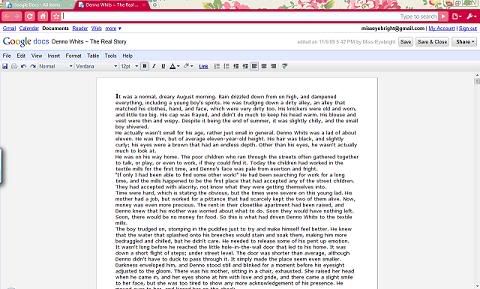
I'm learning something about writing lately. Mainly I'm learning it because of the British Literature class I've been taking. The class isn't geared toward writing, although I'm learning much about writing an essay, which is very helpful.
What I am learning though is that many of those fabulous authors that we still revere today are remembered because they wrote with a purpose. There was something that they wanted to discuss or point out to the world, and one of the best ways to do it was in story form.
Perhaps that was not the way the story began. Many times an author began a new novel simply to earn what money he could. Even so, they knew how to manipulate the plot in order to make it worth while for a person to read and that manipulation became a cause.
Below are some books that made a difference because of what they discuss. I have not read all of these books and so cannot recommend them all, but each one is significant (in many cases, world-wide!) for how it covered a current trend or event, or even how it took a stand for a particular belief.
- Uncle Tom's Cabin is decidedly anti-slavery.
- Little Dorrit points out the shortcomings of the government and social society, as well as showcasing imprisonment in various forms.
- A Picture of Dorian Gray gives us a creepy view of morality, or rather, immorality and it's utter selfishness.
- North and South contrasts an industrial northern England with an agricultural south, and represents a transitioning time from the old, traditional ways to the new, progressive approach that came with the industrial revolution.
- Les Miserables explores redemption, and the characteristics of the law and of grace.
There are a few more contemporary novels that portray similar characteristics.
- The Hunger Games also depicts the government and how controlling and dominating it can become.
- One Day in the Life of Ivan Denisovich centers on oppression from authorities and prison camp survival.
- To Kill a Mockingbird exposes the racist views that were still extremely prevalent at the time of it's writing. (And often still are.)
- Cry, the Beloved Country showed the disintegration of a culture and way of life to native South Africans.
These books resonate with a truth that appeals to people. These books have made an impact and so have the people who penned them in the first place.
That got me to thinking. So much of what is being written nowadays is written purely for entertainment. Now there's nothing wrong with having a great adventure just for the sake of having an adventure, but the truly great books are the ones that show you something about life while you're having that adventure.
I mean really, do all of those vampire-stole-my-heart stories really have anything to offer us other than a chilling thrill and a hint of danger? No. Not even the junky, so-called "Christian" ones. (Honestly, if you're a Christian you should know better!) In my opinion the whole vampire thing is a fad and will fall away in it's turn in a similar manner to Furbys from the 90's. Granted Twilight will hang around and still be popular as the trendsetter of it's day, but there's nothing about those books that is really going to appeal to people for forever. They aren't important. It's the important ones that have made an impact.
As long as we are on this earth there is going to be a government that we are going to have to deal with. Oppression, redemption, and change are things that we will always be coping with.
So, the question I begin to ask myself is, will my writing be influential? Are my books pure entertainment? Granted I have a few "just for fun" books lying around for when I'm in a lazy mood, but if I'm really serious about my work, and if I'm really trying to do my absolute best, then making people think and react to my work is something that desperately needs to be considered.
This applies to any kind of writer out there, not just Christians. Fiction or nonfiction, fantasy or contemporary, sci-fi or historical. If you want to be like the Greats, then it's not just a matter of expanding your vocabulary (watch this video!) it's a matter of being influential.
It's the difference between fluff and something to really chew on. It's the difference between a kindergardener's schoolroom and the Library of Alexandria.
That got me to thinking. So much of what is being written nowadays is written purely for entertainment. Now there's nothing wrong with having a great adventure just for the sake of having an adventure, but the truly great books are the ones that show you something about life while you're having that adventure.
I mean really, do all of those vampire-stole-my-heart stories really have anything to offer us other than a chilling thrill and a hint of danger? No. Not even the junky, so-called "Christian" ones. (Honestly, if you're a Christian you should know better!) In my opinion the whole vampire thing is a fad and will fall away in it's turn in a similar manner to Furbys from the 90's. Granted Twilight will hang around and still be popular as the trendsetter of it's day, but there's nothing about those books that is really going to appeal to people for forever. They aren't important. It's the important ones that have made an impact.
As long as we are on this earth there is going to be a government that we are going to have to deal with. Oppression, redemption, and change are things that we will always be coping with.
So, the question I begin to ask myself is, will my writing be influential? Are my books pure entertainment? Granted I have a few "just for fun" books lying around for when I'm in a lazy mood, but if I'm really serious about my work, and if I'm really trying to do my absolute best, then making people think and react to my work is something that desperately needs to be considered.
This applies to any kind of writer out there, not just Christians. Fiction or nonfiction, fantasy or contemporary, sci-fi or historical. If you want to be like the Greats, then it's not just a matter of expanding your vocabulary (watch this video!) it's a matter of being influential.
It's the difference between fluff and something to really chew on. It's the difference between a kindergardener's schoolroom and the Library of Alexandria.










